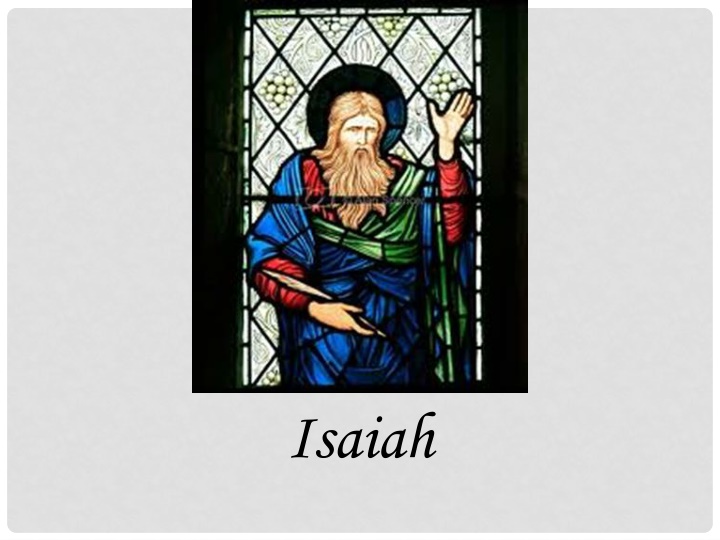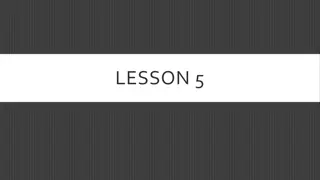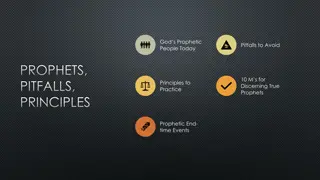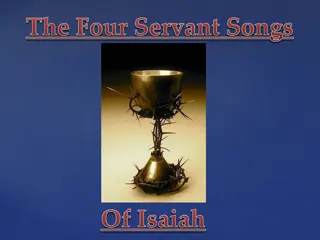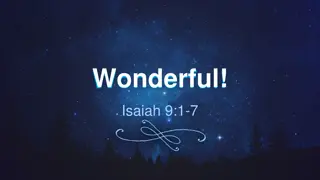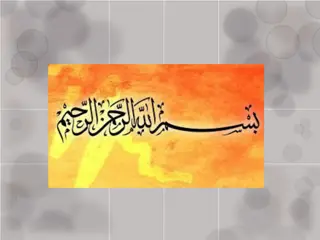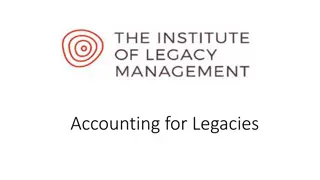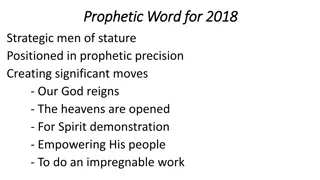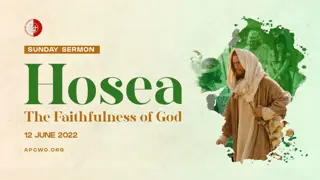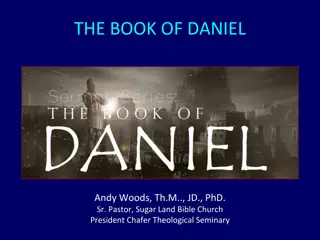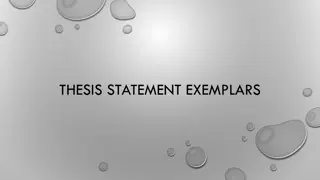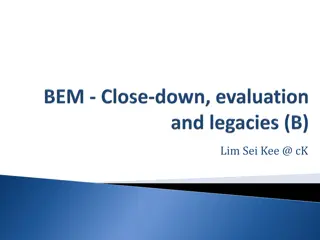The Prophetic Legacies of Isaiah: A Tale of Three Cities and Three Isaiahs
Explore the prophetic journey of Isaiah through the intricacies of Jerusalem, Ninevah, and Babylon, as three distinct figures—each with a unique historical backdrop—deliver divine messages of warning, justice, and hope. Uncover the political, social, and religious contexts that shaped the prophecies of 1st Isaiah in Jerusalem, 2nd Isaiah in Babylon, and 3rd Isaiah in the post-exilic period, revealing a tapestry of spiritual insights and lessons for humanity.
Download Presentation

Please find below an Image/Link to download the presentation.
The content on the website is provided AS IS for your information and personal use only. It may not be sold, licensed, or shared on other websites without obtaining consent from the author.If you encounter any issues during the download, it is possible that the publisher has removed the file from their server.
You are allowed to download the files provided on this website for personal or commercial use, subject to the condition that they are used lawfully. All files are the property of their respective owners.
The content on the website is provided AS IS for your information and personal use only. It may not be sold, licensed, or shared on other websites without obtaining consent from the author.
E N D
Presentation Transcript
A TALE OF THREE CITIES & THREE ISAIAHS! Jerusalem capital of Judah Ninevah capital of Assyria Babylon capital of Babylonia 1st Isaiah (1-39) Active 742-700 BCE 2nd Isaiah (40-55) Active 550-540 BCE 3rd Isaiah (56-66) Active post exile 538 BCE - ?
1ST ISAIAH (1-39) ACTIVE 742 700 BCE Isaiah of Jerusalem Contemporary of Amos and Hosea Deeply involved in the political life of Judah Two crises play a central role in his oracles: War against Israel and Damascus 734 BCE Assyria s invasion in 701 BCE Jerusalem won t fall. Why? People were convinced Yahweh loved Jerusalem and its temple so much that it could never fall Isaiah s proclamation to trust solely in the God of Zion seemed to support this! Isaiah warned against this false sense of security and focused on God s demand that justice be done, and foreign alliances be avoided.
1ST ISAIAH - INTRODUCTION Isaiah emphasized that God is holy and since God chooses to dwell with his people, they should imitate God by living justly. Isaiah railed against the rich and powerful for their unjust treatment of the poor. Isaiah announced God s judgement against his people, and predicted their downfall, but held out hope that God would save a remnant who would live the way God wants God s chosen people to live, under a king who will obey Yahweh, unlike Ahaz. Focus is on the David Covenant, rather than the Sinai Covenant.
1ST ISAIAH - OUTLINE Isaiah 1-12: Prophecies aimed at Judah prior to Israel going into exile. Isaiah 13-23: Prophecies against foreign nations Isaiah 24-27: Little Apocalypse of Isaiah, probably added much later Isaiah 28-33: Judgement messages against Judah during the time of Hezekiah Isaiah 34-35: Vision of Jerusalem, probably added later Isaiah 36-39: Stories of Isaiah s later life, some of which matches 2Kings 18-20
2ND ISAIAH ACTIVE 550-540BCE The image in the following slide of the Ishtar Gates of Babylon set the stage for the message of 2nd Isaiah. Unlike 1st Isaiah, who worked in Jerusalem during the 8th century, 2nd Isaiah did his work in Babylon in the mid 6th century. He offers a radical vision of a Persian messiah named Cyrus who will allow God s covenant people to return home to Jerusalem. God will lead them out the same Ishtar Gates that they straggled through as exiles almost 50 years earlier!
2ND ISAIAH - OUTLINE Isaiah 40: Wonderful news is proclaimed. God is coming to free his people and bring them home. Isaiah 41-48: God remains faithful to his covenant people, and will bring them home through a new Exodus. Isaiah 49-55: God calls his people to become what they were created to be a light to the nations. They should listen to God s teachings and practice them in their lives.
3RD ISAIAH ACTIVE 538 500?BCE These chapters (56-66) are set once again back in Jerusalem. Cyrus the Persian now rules Babylon, and has set them free. They are busy trying to figure out how to live as free people once again but are opposed by those who had remained behind 50 years ago. Should they rebuild the temple, and reinstate all of its sacrifices, or is synagogue worship adequate? Should we try to have a Davidic King again? What role if any should the Torah play in our public and private lives?
3RD ISAIAH - OUTLINE Isaiah 56-59: Isaiah calls on them to reform their worship and turn away from idols. He also returns to the prophetic call for ethical lives. Unlike 2nd Isaiah, 3rdIsaiah condemns Israel s sinfulness repeatedly! He holds out hope that a righteous few will heed his warnings. Isaiah 60-62: Reminiscent of 2nd Isaiah, he proclaims God s promise to comfort Israel, restore it, and through them to draw all nations to worship God. Isaiah 63-66: A recap of the entire prophetic book of Isaiah. God will bless his people and reject those nations that refuse to worship God. God reminds his people that the promise of a new creation is contingent upon their living according to God s law.
